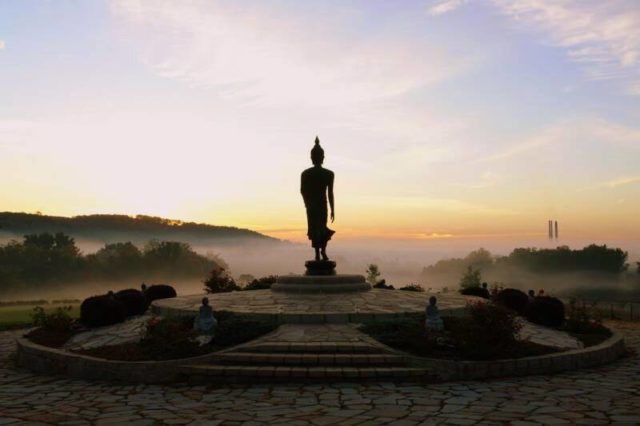The Great Chapter (Mahāvagga)
1.The Going Forth (Pabbajjā Sutta)
405. I will tell of the going forth,
how the One with Vision went forth,
how, while investigating,
he approved of the going forth.
406. “This home life is confinement,
a basis for dust;
the going forth is like an open space”:
having seen this, he went forth.
407. Having gone forth, he avoided
evil deeds with his body.
Having abandoned verbal misconduct,
he purified his livelihood.
408. The Buddha went to Rājagaha,
[the city] Giribbaja of the Magadhans.
Adorned with the excellent marks,
he walked for alms [in the city].
409. While standing in his palace,
Bimbisāra caught sight of him.
Having seen him endowed with the marks,
he uttered this statement:
410. “Sirs, look at him,
handsome, stately, pure;
endowed with good conduct,
he looks a mere yoke’s length ahead.
411. “With downcast eyes, mindful,
it seems he is not from a low family.
Let the king’s messengers run out.
[Find out] where the bhikkhu will go.”
412. The messengers sent by the king
followed closely behind him,
[thinking:] “Where will the bhikkhu go?
Where is his dwelling place?”
409. While standing in his palace,
Bimbisāra caught sight of him.
Having seen him endowed with the marks,
he uttered this statement:
410. “Sirs, look at him,
handsome, stately, pure;
endowed with good conduct,
he looks a mere yoke’s length ahead.
411. “With downcast eyes, mindful,
it seems he is not from a low family.
Let the king’s messengers run out.
[Find out] where the bhikkhu will go.”
412. The messengers sent by the king
followed closely behind him,
[thinking:] “Where will the bhikkhu go?
Where is his dwelling place?”
413. Walking on alms without skipping houses,
his sense doors guarded, well restrained,
clearly comprehending, ever mindful,
he quickly filled up his bowl.
414. Having walked on alms round,
the muni departed from the city.
He ascended Mount Paṇḍava:
“His dwelling place must be here!”
415. Having seen that he had entered his dwelling,
the messengers then approached;
but one messenger returned
and informed the king:
416. “Great king, this bhikkhu
lives on the eastern side of Paṇḍava.
He sits in a mountain cavern
like a tiger, a bull, or a lion.”
417. Having heard the messenger’s report,
the khattiya set out in a fine vehicle.
Hurriedly, he departed
in the direction of Paṇḍava Mountain.
418. Having gone along the ground for vehicles,
the khattiya descended from his vehicle;
having approached on foot,
he arrived and entered.
419. Having sat down, the king greeted him
and then made polite conversation.
When the courtesies were finished,
he then uttered this statement:
420. “You are young, a lad,
a youth in the prime of life,
endowed with beauty and stature,
like a well-born khattiya.
421. “I will give you wealth—enjoy it
while shining at the head of an army,
accompanied by a troop of bull elephants.
Being asked, tell me your birth.”
422. “There is, O king, a country straight ahead,
on the slope of the Himalayas,
abounding in wealth and energy,
[ruled] by one native to the Kosalans.
423. “I am by clan an Ādicca,
by birth I am a Sakyan.
I have gone forth from that family, O king,
not longing for sensual pleasures.
424. “Having seen the danger in sensual pleasures,
having seen renunciation as security,
I will go for the purpose of striving:
it is here that my mind delights.”
"I am by clan an Ādicca,
by birth I am a Sakyan.
I have gone forth from that family, O king,
not longing for sensual pleasures."
2. Striving (Padhāna Sutta)
425. “When, resolved upon striving,
I had gone to the Nerañjarā River,
as I was meditating very strenuously
to attain security from bondage,
426. “Namucī approached me,
speaking compassionate words:
‘You are thin, pale;
you’re on the verge of death.
427. “‘A thousand parts belong to death,
one fraction of your life remains.
Live, sir, life is better!
While living, make merits!
428. “‘While you are living the spiritual life
and performing the fire sacrifice,
abundant merit is stored up.
Why devote yourself to striving?
429.“‘Hard to travel is the path for striving,
hard to practice, hard to achieve.’”
Speaking these verses, Māra stood
in the presence of the Buddha.
430. When Māra had spoken in such a way,
the Blessed One said this to him:
“Kinsman of the heedless, Evil One,
you have come here with a purpose.
431. “I do not have any need
even for the slightest merit.
It is fitting for Māra to speak
to those who have need of merits.
432. “I have faith and energy too,
and wisdom exists in me.
When I am so resolute,
why do you ask me to live?
433. “This wind might dry up
even the streams of the rivers,
so why, when I am resolute,
should it not dry up my blood?
434. “When the blood is drying up,
the bile and phlegm dry up.
When my muscles are wasting away,
my mind becomes even more serene,
and my mindfulness and wisdom
and concentration become more firm.
435. “While I am dwelling in such a way
I have experienced extreme pain,
yet my mind does not turn to sensual pleasures:
behold the purity of the being!
436. “Sensual pleasures are your first army;
the second is called discontent.
Hunger and thirst are the third;
the fourth is called craving.
437. “The fifth is dullness and drowsiness;
the sixth is called cowardice.
Doubt is your seventh;
your eighth, denigration and pride.
438. “Gain, praise, and honor,
and wrongly obtained fame [is ninth];
[the tenth is when] one extols oneself
and looks down at others.
439. “This is your army, Namucī,
the squadron of the Dark One.
A weakling does not conquer it,
but having conquered it, one gains bliss.
440. “I wear muñja grass;
wretched would life be to me.
It’s better that I die in battle
than live on defeated.

441. “Some ascetics and brahmins,
engulfed here, are no longer seen.
They do not know the path by which
the disciplined ones travel.
442. “Having seen the bannered army all around,
[and] Māra with his vehicle ready,
I will go out to meet him in battle:
may he not dislodge me from my place!
443. “Though the world with its devas
cannot overcome that army of yours,
I will destroy it with wisdom,
like a fresh clay bowl with a stone.
444. “Having gained mastery over my intention,
and with mindfulness well established,
I will wander from realm to realm,
guiding many disciples.
445. “Heedful and resolute,
those practitioners of my teaching,
against your wishes, will go
to the state where one does not sorrow.”
446. “For seven years I followed the Blessed One,
[trailing him] step by step,
but I have not found an opening
in the Enlightened One, who is mindful.
447. “There was a crow that circled around
a stone that looked like a lump of fat:
‘Perhaps we’ll find something tender here;
perhaps there may be something tasty.’
448. “But finding nothing tasty there,
the crow departed from that place.
Just like the crow that attacked the stone,
we leave Gotama disappointed.”
449. So much was he stricken with sorrow
that his lute fell from his armpit.
Thereupon that saddened spirit
disappeared right on the spot.
"Well-spoken speech is best, the good say;
speak Dhamma, not non-Dhamma—that is second."
3. Well Spoken (Subhāsita Sutta)
Thus have I heard. On one occasion the Blessed One was dwelliing at Sāvatthī in Jeta’s Grove, Anāthapiṇḍika’s Park. There the Blessed One addressed the bhikkhus thus: “Bhikkhus!”
“Bhante!” those bhikkhus replied. The Blessed One said this:
“Bhikkhus, when speech possesses four factors, it is well spoken, not badly spoken, and it is blameless and irreproachable by the wise. What four? Here, a bhikkhu speaks only what is well spoken, not what is badly spoken. He speaks only Dhamma, not non-Dhamma. He speaks only what is pleasing, not what is displeasing. He speaks only what is true, not lies. When speech possesses these four factors, it is well spoken, not badly spoken, and it is blameless and irreproachable by the wise.”
This is what the Blessed One said. Having said this, the Fortunate One, the Teacher, further said this:
450. “Well-spoken speech is best, the good say;
speak Dhamma, not non-Dhamma—that is second.
Speak what is pleasing, not displeasing—that is third;
speak the truth, not lies—that is fourth.”
Then the Venerable Vaṅgīsa rose from his seat, arranged his upper robe over one shoulder, and having reverently saluted the Blessed One, said to him: “An inspiration has come to me, Blessed One! An inspiration has come to me, Fortunate One!”
The Blessed One said: “Then express your inspiration, Vaṅgīsa.”
The Venerable Vaṅgīsa then extolled the Blessed One to his face with suitable verses:
451. “One should utter only such speech
by which one does not torment oneself
nor cause injury to others:
that speech truly is well spoken.
452. “One should utter only pleasant speech,
speech that is gladly welcomed.
One should speak words that bring nothing bad,
[speech] that is pleasing to others.
453. “Truth, indeed, is deathless speech:
this is an ancient principle.
The good and the Dhamma, good people say,
are established upon truth.
454. “The speech that the Buddha utters
for the attainment of nibbāna, the secure,
for making an end to suffering,
is indeed the supreme speech.”
| There are no products in your cart. |

